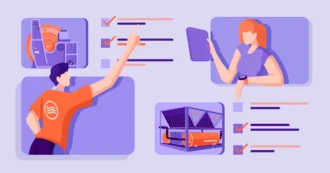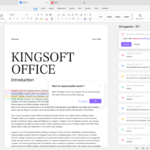What’s the tech behind background checkers? Are they complex?
- 1 Types of background checks
- 1.1 Criminal Background Check:
- 1.2 Credit Background Check:
- 1.3 Employment Background Check:
- 1.4 Education Background Check:
- 1.5 Reference Background Check:
- 1.6 Social Media Background Check:
- 2 Technologies used in background checks
- 2.1 Databases:
- 2.2 Algorithms:
- 2.3 Machine Learning:
- 2.4 Privacy concerns
- 3 Conclusion
Background checkers are tools used to investigate an individual’s history and personal information. The purpose of a background check can vary depending on the context, but it is generally conducted to verify information provided by an individual, assess risk, and make informed decisions.
Background checks are becoming increasingly important in modern society. Many employers, educational institutions, and government agencies use background checks as part of their screening process for applicants. Landlords, financial institutions, and insurance companies also often use background checks to assess the risk of providing services to an individual. Additionally, background checks are frequently used in criminal investigations and court proceedings.
The complexity of a background check can vary depending on the scope and purpose of the investigation. Some checks may be relatively simple, only verifying basic personal information such as a person’s name, date of birth, and address. However, more comprehensive background checks can be incredibly complex and time-consuming, requiring access to various databases, court records, and other sources of information.
Background checks can also be challenging because the information being sought is often spread across multiple sources and can be difficult to find. For example, criminal records may be stored in multiple databases, and the process of accessing them can vary depending on the jurisdiction. Similarly, verifying an individual’s education or employment history may require contacting multiple institutions or companies, each with their own procedures for providing information.
The complexity of background checks is further compounded by the need to ensure accuracy and reliability. Incorrect or incomplete information can result in biased or unfair decisions that can have far-reaching consequences for individuals. As a result, background checkers must use a variety of techniques to ensure that the information they gather is as accurate and complete as possible.
Types of background checks
Background checks can be conducted for various purposes, and the types of background checks can differ based on the data that is gathered and the sources from which the information is obtained. Below is an overview of some common types of background checks and the specific data that is gathered for each type of check.
Criminal Background Check:
A criminal background check is conducted to verify whether an individual has a criminal record. This type of background check can be conducted at various levels, such as local, state, or federal. The data gathered for a criminal background check can include arrest records, convictions, and warrants. The criminal background check may also show any court appearances, sentencing, and other relevant information related to the criminal history of the individual.
Credit Background Check:
A credit background check is conducted to determine an individual’s creditworthiness. It is often used by financial institutions, landlords, and employers to assess an individual’s ability to manage finances. The data gathered for a credit background check can include credit scores, payment history, debts, bankruptcies, and other credit-related information.
Employment Background Check:
An employment background check is conducted by employers to verify the information provided by job applicants. The data gathered for an employment background check can include employment history, education, certifications, and professional licenses. It may also include criminal background checks, credit checks, and drug tests.
Education Background Check:
An education background check is conducted to verify the educational credentials of an individual. The data gathered for an education background check can include educational degrees, transcripts, and professional certifications.
Reference Background Check:
A reference background check is conducted to verify the references provided by an individual. It is often used by employers to verify the work experience and personal qualities of a job applicant. The data gathered for a reference background check can include work history, professional relationships, and personal character references.
Social Media Background Check:
A social media background check is conducted to review an individual’s social media profiles and activity. It is often used by employers to assess a job applicant’s online behavior and reputation. The data gathered for a social media background check can include posts, comments, and other social media activity that may indicate an individual’s values, interests, and potential risks.
In summary, background checks can vary depending on the purpose and scope of the investigation. The types of background checks can include criminal, credit, employment, education, reference, and social media background checks. The data gathered for each type of check can vary, but they all aim to provide a comprehensive and accurate picture of an individual’s history and personal information.
Technologies used in background checks
Background checks rely heavily on various technologies to gather and analyze the vast amounts of data required to create a comprehensive report. Some of the technologies used in background checks include databases, algorithms, and machine learning. In this review of Instant Checkmate, we will explore how these technologies work together to create a comprehensive background check report.
Databases:
Background check companies like Instant Checkmate use a variety of databases to access public records and other sources of information. These databases can include court records, property records, and motor vehicle records, among others. By accessing these databases, background check companies can quickly and efficiently gather the information required for a comprehensive report.
Algorithms:
Background check companies use algorithms to analyze the data gathered from various sources. These algorithms can quickly identify patterns and trends in the data, helping to identify potential red flags that may require further investigation. For example, an algorithm may flag an individual with multiple criminal records or a history of bankruptcy.
Machine Learning:
Machine learning is a form of artificial intelligence that can be used to improve the accuracy and efficiency of background checks. Machine learning algorithms can be trained to identify patterns in the data and make predictions based on that information. For example, a machine learning algorithm could be trained to predict the likelihood that an individual will default on a loan based on their credit history.
By combining these technologies, background check companies like Instant Checkmate can create a comprehensive report that includes a variety of information, such as criminal records, court documents, and credit reports. These reports can be customized to meet the needs of the customer, providing a tailored solution that meets their specific requirements.
In summary, background checks rely heavily on various technologies to gather and analyze data from various sources. Databases, algorithms, and machine learning are just some of the technologies used in background checks. These technologies work together to create a comprehensive report that can be used to verify information, assess risk, and make informed decisions. If you need a reliable background check company, you can consider Instant Checkmate as an option.
Privacy concerns
As background checks become increasingly common in modern society, concerns about privacy have emerged. There are several privacy concerns associated with background checks, including the potential misuse of personal information, the risk of identity theft, and the potential for inaccurate information to be used to make decisions about individuals.
One of the primary concerns about background checks is that personal information gathered during the process may be misused. For example, employers may use the information gathered during a background check to discriminate against individuals based on their race, gender, or other protected characteristics. Similarly, landlords or financial institutions may use the information gathered during a background check to make decisions about an individual that are not based on their qualifications or ability to pay, but rather on their personal characteristics.
Another concern about background checks is the risk of identity theft. Because background checks often require the collection of sensitive personal information, such as social security numbers, addresses, and date of birth, there is a risk that this information could be stolen and used for fraudulent purposes.
To protect individuals’ privacy, there are legal requirements surrounding background checks. For example, the Fair Credit Reporting Act (FCRA) establishes rules for how background checks can be conducted and how the information gathered during a background check can be used. The FCRA requires that individuals be informed when a background check is being conducted, and that they are given the opportunity to dispute any inaccurate information that is found.
Additionally, some states have enacted their own laws regulating background checks. For example, California’s Investigative Consumer Reporting Agencies Act requires that individuals be informed when a background check is being conducted and that they are given a copy of the report. The law also restricts the use of certain information, such as bankruptcy information that is more than 10 years old.
Conclusion
In conclusion, background checks are complex and require the use of various technologies to gather and analyze data from multiple sources. The different types of background checks, including criminal, credit, employment, education, reference, and social media background checks, provide a comprehensive picture of an individual’s history and personal information. The data gathered during a background check is critical to verifying information, assessing risk, and making informed decisions.
Technologies used in background checks include databases, algorithms, and machine learning. These technologies work together to provide a tailored solution that meets the specific requirements of each customer. The use of these technologies also allows background check companies to gather and analyze vast amounts of data quickly and efficiently.
While background checks are important in modern society, they can also raise concerns about privacy. Legal requirements, such as the FCRA and state-specific laws, exist to protect individuals’ privacy and ensure that background checks are conducted fairly and accurately.
In light of the importance of background checks, it is essential to continue research and development in this field. As technology continues to evolve, new techniques and tools will emerge that can improve the accuracy and efficiency of background checks. Additionally, continued research and development can help to identify and address any potential privacy concerns associated with background checks.

















